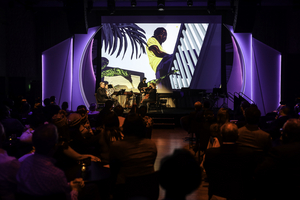Review: THE CARTOGRAPHY PROJECT at The Kennedy Center
Eight new commissioned works by the National Symphony Orchestra and the Washington National Opera responding to Black Lives Matter

It was a long road to create "The Cartography Project" - some 20 months, says Kennedy Center president Deborah Rutter - dating back to the national and international uprisings following the murder of George Floyd in May 2020. But, she said, in exploring the role that art and artists can play in social change, "process is as important as performance."
The organizing idea was for the National Symphony Orchestra and Washington National Orchestra to commission new pieces responding to the reckoning from Black artists. The focus from the beginning was on the vibrancy of the Black lives that mattered - not the unjust deaths that made the victims' names widely known.
Presented as "The Cartography Project," the aim was to "map the humanity of those who were gone too soon." Marc Bamuthi Joseph, Vice President and Artistic Director of Social Impact at the Kennedy Center, says in the electronic program.
The result is not quite the celebration of life it may have intended. Instead, the first of two nights of the performance Tuesday inside the REACH complex's Studio K, with its modest stage, cabaret tables and nightclub lighting, had the hushed, reverent tone of a memorial. Indeed, the families of many of those honored, including Freddie Grey, Eric Garner and Rayshard Brooks were in attendance.
"There is power in speaking a name," declares one one of the evening's pieces. And yet it was rare to hear the names of Breonna Taylor, or Tamir Rice or George Floyd in the librettos of the five short operatic pieces. Instead, the works tended toward the poetic and the abstract - areas where the three new classical works were already operating, often in minor key contemplation.
Nathaniel Heyder's elegiac "Ahead of Time" began the evening. Dedicated to Tamir Rice, the 12 year old Cleveland boy killed by police, it was a small ensemble work that, with a half dozen musicians including xylophone, was the largest grouping of the night.
Like the rest of the pieces, it was introduced by T.L. Benton's filmed interviews with the creators and the music itself accompanied by commissioned art that played on screens above the ensemble. Heyder's work was especially well served with the paintings of young men and plants by Chicago artist Brandon Breaux.
Kennedy Center composer-in-residence Carlos Simon's "The Road Ahead" was charged with the spoken word performance by its librettist, Joseph.
Liz Gre's "A Progeny of Perpetual Independence," with libretto by Junauda Petrus-Nash, featured soprano Amber R. Monroe singing a work derived after interviews with Black residents of the Twin Cities, Minnesota, apparently at an Independence Day celebration. "Independence and we ain't free," she sang.
Jessica Mays' commission "Anthem for GO" added percussion amid the strings and drummer Scott Christian blew a whistle occasionally as well.
B.E. Boykin's "Mo(u)ring" featured just piano and cello, with tenor Martin Bakari emoting Brittny Ray Crowell's pointed libretto, inspired by her research into Rayshard Brooks, the 27-year-old man fatally shot by Atlanta police in 2020, who she learned loved to dance.
Because "Pretty Girl," came from twins, Oakland composer Jens Ibsen and librettist Yasmina Ibsen, it was fitting it was also sung by a pair of sopranos, Katerina Burton and Amber R. Monroe, who sang of the death of teenager Nia Wilson, killed by a knife-wielding man in 2018 with gravity and purpose. Some of its lines would not be out of place in a pop song: "Pretty girls don't suffer no fools" but it also reflected resilience: "Now that you're our angel, we'll never give up the fight" - and an audience clap-along.
Derek Douglas Carter's "Breonna's Lullaby," by contrast was contemplative; an attempt, he says "to lay Ms. Taylor to rest."
Baltimore composer Jasmine Barnes' "The Burning Bush," about the death of Freddy Grey, was the night's most elaborate., with baritone Daniel J. Smith embodying the "invisible man" warning "Baltimore will flame again," in a vaudeville style sideshow with bits of ragtime piano and soprano Suzannah Wadington portraying what librettist Joshua Banbury called "the white savior," a fussy impresario presenting "a spectacle to heed."
Altogether it scarcely filled an hour, but it was astounding the amount of talent involved in every aspect of the evening, the combined weight of the vital message shared and the hint it may suggest a turning point for large arts organizations to heed cries for social justice.
Although performed for just two nights, it will likely continue to inspire as a finished video project online.
Running time: About 65 minutes.
Photo credit: "The Cartography Project" performance of Nathan Nayder's "Ahead of Time," with art by Brandon Breaux.. Photo by Jati Lindsay.
"The Cartography Project" will be performed again Wednesday, March 16 at 7:30 p.m. at the John F. Kennedy Center for Performing Arts, 2700 F St NW. Tickets available through 202-467-4600 or online. A docuseries on the project is also available online.
Reader Reviews

Videos

